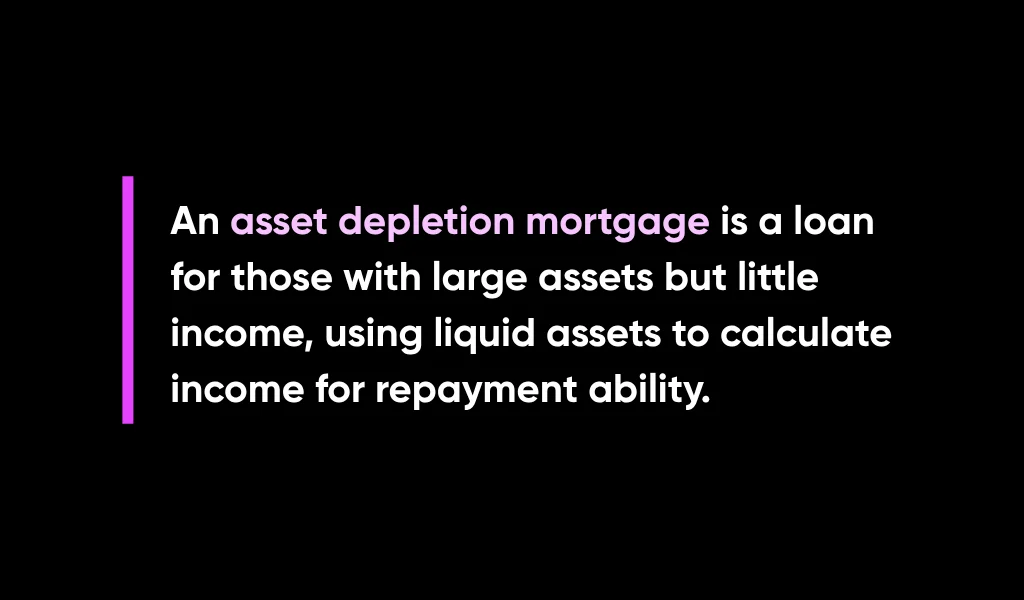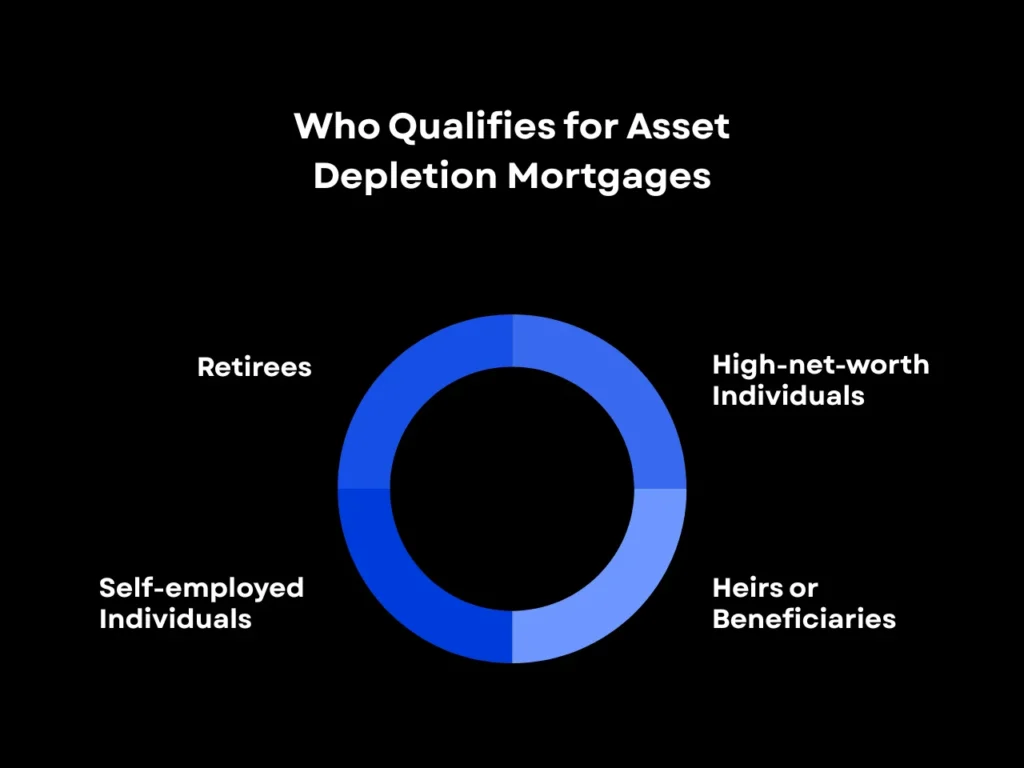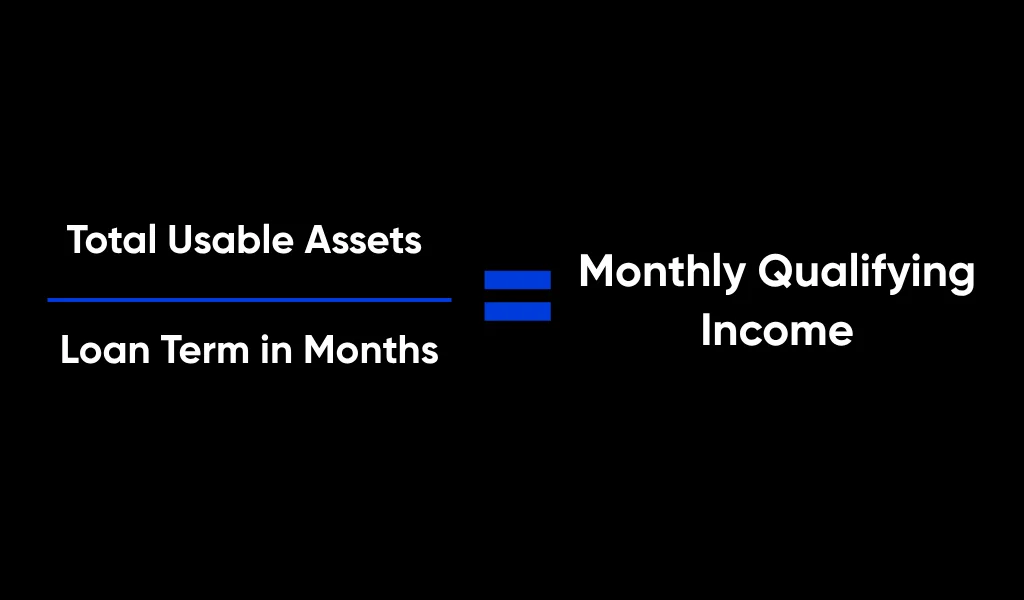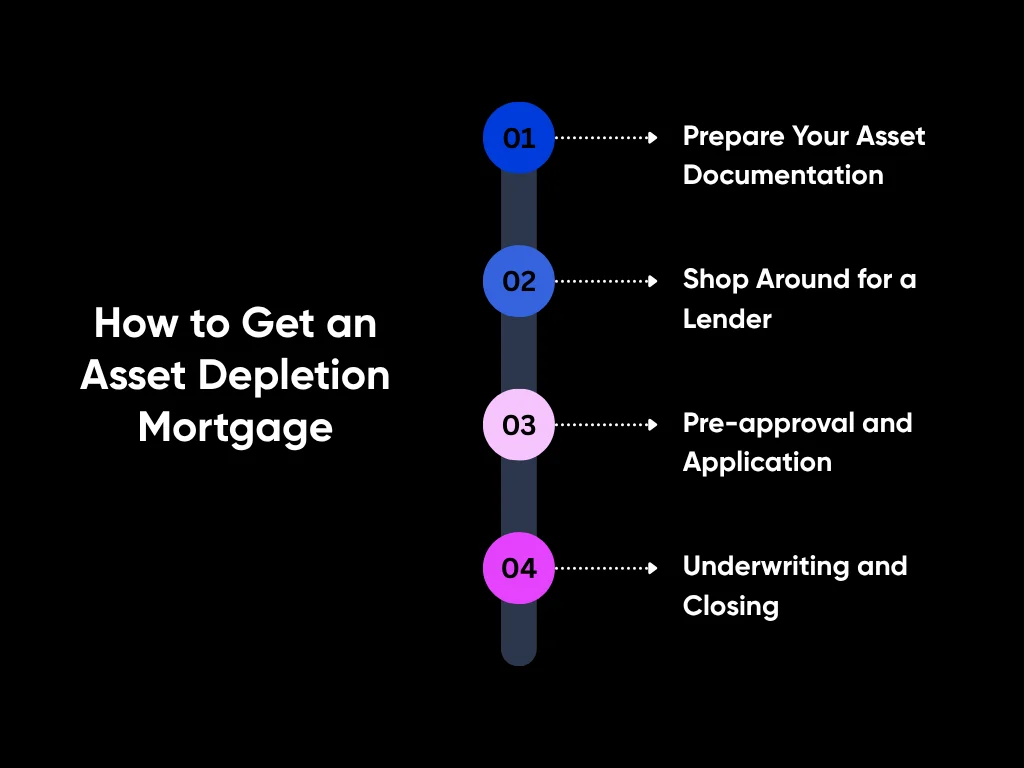For retirees and real estate investors, being able to afford a mortgage isn’t usually a problem, but having to prove a healthy income under strict lending guidelines often is. But what if you could qualify for a mortgage by using your assets instead? An asset depletion mortgage lets you do exactly that.
At Defy Mortgage, we tailor non-traditional mortgages to fit the exact financial needs and goals of borrowers like you. Our Mortgage Consultants take a holistic look at your finances to identify which of the 75+ mortgage options would be the perfect fit. Everything from our asset depletion loans and bank statement loans to our jumbo mortgages and DSCR loans is strategically structured to ensure that our solutions support your long-term financial success.
In this guide, you’ll learn:
- How asset depletion mortgages work and what requirements lenders look for.
- Which asset types can be used.
- How Defy Mortgage’s programs differ from traditional lenders.
- Smart strategies for using an asset depletion loan to strengthen your financial flexibility.
What Is an Asset Depletion Mortgage?
An asset depletion mortgage is a type of loan designed for individuals who have significant assets but may not have a regular income stream. The lender uses the value of the borrower’s liquid assets (such as savings, investments, or retirement accounts) to calculate a monthly income equivalent, which is then used to determine the borrower’s ability to repay the loan.

Asset depletion mortgages, also known as asset dissipation mortgages, fall under the category of non-QM (non-qualified mortgage) loans. These types of loans aren’t required to meet the strict requirements set by the Consumer Financial Protection Bureau (CFPB) and are typically much more flexible for individuals who don’t fit the mold of conventional loan requirements.
Who is Asset Depletion for?
An asset depletion or asset dissipation loan works best for borrowers with substantial liquid assets but little to no documented income, such as:
- Retirees who have built a significant nest egg but no longer have a regular paycheck.
- Self-employed individuals with fluctuating income but considerable savings or investment portfolios.
- High-net-worth individuals who prefer to rely on their wealth rather than traditional income to qualify for a loan.
- Heirs or beneficiaries with considerable savings from an inheritance or other sources of liquid assets.

Asset depletion mortgages are particularly effective for kickstarting a real estate investment portfolio, especially in states with no capital gains tax, such as Texas and Tennessee. Lacking a heavy tax obligation, property appreciation can build more momentum, allowing you to grow your investments much more efficiently.
How Does an Asset Depletion Mortgage Work?
In an asset depletion mortgage, lenders take the total value of the assets you used to qualify and divide them by the number of months in your loan term. So if you’re taking out a 30-year mortgage, your total assets will be divided by 360 months. However, it isn’t as straightforward as simply getting the sum total value of your assets.
How Lenders Calculate Usable Assets
Not every dollar in your account counts equally. Asset depletion mortgage lenders discount certain asset types to account for potential volatility or withdrawal restrictions. Here’s a general breakdown:
- Cash and money market accounts: 100% of the balance is considered, since the funds are already liquid.
- Stocks, bonds, and mutual funds: Usually up to 80% of the current market value.
- Retirement accounts (IRAs, 401(k)s): Typically up to 70% if you’re of retirement age; if you’re under that age, only 50% may count.
Each lender sets their own guidelines, and percentages may vary slightly. Defy Mortgage reviews your full portfolio to help you maximize the amount of assets that can qualify toward your mortgage income.
How to Calculate Asset Depletion Income
The formula for calculating qualifying asset depletion income is simple:
(Total Usable Assets) ÷ (Loan Term in Months) = Monthly Qualifying Income

Let’s break that down with an example:
Suppose you have the following assets, and that you are under retirement age:
- $1,000,000 in savings (100% usable).
- $1,000,000 in a money market account (100% usable).
- $2,000,000 in a retirement account (50% usable, since you’re under retirement age).
- $1,000,000 in stocks (60% usable).
Your total usable assets would be:
$1M + $1M + $1M + $600K = $3.6 million
If you’re applying for a 30-year mortgage, you’d divide that $3.6 million by 360 months:
$3,600,000 ÷ 360 = $10,000/month in qualifying income
This becomes the “income” that lenders consider when determining your maximum loan amount for an asset depletion loan.
At Defy Mortgage, we can tailor this approach with loan terms as short as 5 years, meaning your qualifying income can be based on dividing your assets by just 60 months, giving you more purchasing power. Depending on the circumstances, this can be the difference between purchasing one single-family rental and purchasing a whole row of them.
What Assets Are Eligible for a Mortgage Asset?
Lenders generally accept liquid or near-liquid assets that can be easily verified and converted to cash. Eligible assets often include:
- Checking and savings accounts
- Certificates of deposit (CDs)
- Money market funds
- Stocks, bonds, and mutual funds
- Retirement accounts (401(k), IRA, SEP)
- Trust funds (depending on withdrawal access and documentation)
Assets such as real estate, personal property, or business holdings typically don’t qualify unless they can be liquidated or verified through supporting financial documentation. If you’d like to tap into the value of your real estate investments, a home equity loan or a DSCR cash-out refinance may align better with your assets.
Unsure how much of your assets can be used to qualify? Reach out to Defy Mortgage directly to discover how much of your wealth you can make use of.
Eligibility Checklist & Qualification Criteria
Defy Mortgage offers asset depletion loans tailored to real estate investors who have substantial liquid assets but may not rely on traditional income sources. If you’re considering applying for an asset depletion loan, here’s what you’ll need to know:
- Proof of liquid asset ownership. Eligible assets include:
- Bank statements for savings and checking accounts to confirm available cash reserves. Up to 100% of the funds in these accounts are considered.
- Investment account statements detailing stocks, bonds, mutual funds, and other securities, up to 80% of the current market value. Money market accounts are considered at the going exchange rate.
- Retirement account statements (e.g., IRAs or 401(k)s), if applicable and accessible based on age or withdrawal eligibility (typically 59.5 years).
- Eligible properties: Primary residences, second homes, single family rentals, vacation homes, condominiums (warrantable & non-warrantable), and mutli-family homes between 2-4 units.
- Minimum FICO score: 640.
- Max DTI: 43% (35% ideal).
- Loan structures: Fixed, ARMs, and interest-only options.
- Maximum LTV: 80% for purchase and R/T Refi.
- Maximum loan amount: $6M
- Alternative income documentation toward loan qualification.
Please note that requirements can vary by lender. The exact LTV requirements will depend on specific applicant information, such as credit score, DTI, and other factors, and can be subject to change.
For more accurate information regarding fees and terms based on your financial profile, you can book a call with us or call (615) 622-1032.
How to Get an Asset Depletion Mortgage
Getting an asset depletion mortgage generally follows a similar process as applying for other types of mortgage, with the exception of preparing your assets for assessment. Here’s a step-by-step application process:
- Prepare your asset documentation: Ensure you have significant assets in accounts like savings, investments, or retirement funds that can be used to qualify for the mortgage. Remember that different lenders value assets in different ways, and that more volatile assets like stocks are likely only partially valued.
- Shop around for a lender: Once you’ve assessed your situation and prepared documentation, the next step is to research and select a specialized lender. Asset depletion loans aren’t widely available, so the best way to quickly find lenders who offer them is to focus on non-QM lenders (like Defy Mortgage!).
- Pre-approval and application: After you’ve arrived at a shortlist of a few ideal lenders, it’s advisable to get pre-approved with each of them to find out the preliminary amount and rate they’re willing to offer you. If you’ve found a lender whose pre-approval estimates best fit your needs, you can begin the application process with them.
- Underwriting and closing: During underwriting, the lender will verify your asset documentation and assess other factors like credit history and debt-to-income ratio. If approved, the lender will provide a loan estimate and closing disclosure detailing the loan terms, interest rate, repayment period, monthly payments, and closing costs. Review these documents carefully. At closing, you’ll sign the final paperwork and pay any required closing costs.

At Defy Mortgage, we can provide you with personalized assistance through each of these steps. With fast pre-approvals, your own dedicated Mortgage Consultant, and a streamlined underwriting process designed specifically for non-traditional borrowers, we make the application process as simple and stress-free as possible.
Asset Depletion vs. Other Loans
| Conventional Loan | Asset-Based Mortgage | Asset Depletion Mortgage | |
| Income verification | W-2s, pay stubs, tax returns. | Assets, including illiquid assets such as real estate. Must be pledged or liquidated. | Liquid assets only, but there is no need to liquidate as long as the borrower can make payments. |
| Ideal borrower | Individuals with healthy financial profiles and steady income. | Those with various types of assets that they’re willing to part with. | Retirees, self-employed individuals, or high-net-worth borrowers with substantial liquid assets but limited income. |
| Underwriting criteria | Strict; includes debt-to-income ratios, credit scores, and employment verification. | Flexible, focusing on the value of the assets. | Flexible, focusing on the value of the assets. |
If you don’t quite have the liquid assets for an asset depletion loan yet, you also have other options. Here are a few non-QM loans that could be a good fit:
- DSCR Loans: A Debt-Service Coverage Ratio loan (DSCR) allows real estate investors to qualify for a mortgage based on the property’s rental income rather than their own.
- Bank Statement Loans: With a bank statement loan, you can qualify for a mortgage using your bank statements. Lenders will review your deposits to determine affordability.
- P&L Loans: A Profit & Loss Statement loan can help you qualify for a mortgage using your business’s CPA-prepared P&L statements.
How to Get an Asset Depletion Mortgage with Defy Mortgage
At Defy Mortgage, we redefine what it means to qualify for a mortgage loan. We’re not limited by traditional income requirements. Instead, we empower you to use all of the finances at your disposal to unlock opportunities, including using assets as proof of financial strength.

Our asset depletion program is specifically designed for high-net-worth individuals, self-employed professionals, investors, and retirees seeking a lending partner that understands their complex financial profiles.
With our decades of collective experience in various mortgage markets across the United States, we’ve developed a deep understanding of how to structure creative lending solutions to hit all the right marks. Whatever your plans may be, you can be sure our products will work with you, not against you.
When you work with Defy Mortgage, you’ll get:
- Personalized portfolio evaluation: We analyze your entire asset picture to maximize what counts toward qualifying income.
- Flexible terms: 5-year programs, adjustable rates, and interest-only options available. Foreign nationals with no US credit score or Social Security Number are welcome.
- Fast, hassle-free approvals: Skip the tax returns, W-2s, or P&L statements; we qualify you based entirely on your verified assets.
- Dedicated lending experts: Our mortgage team specializes in non-QM loans, including asset-based financing, ensuring a seamless experience from application to closing.
Whether you’re purchasing a new investment property or refinancing, Defy Mortgage can help you turn your assets into working capital for your future real estate investments without having to sell them and disrupt your asset portfolio. Contact us today to learn how much you qualify for.
Key Takeaways
For real estate investors, retirees, and other financially independent borrowers, an asset depletion mortgage offers the freedom to qualify for a loan based on actual wealth, not income. As long as you have substantial liquid assets, you can easily unlock financing opportunities that were previously locked behind strict traditional income requirements.
Remember that not all types of assets are treated equally. Lenders typically place higher value on cash and investment accounts. More volatile or restricted assets, such as stocks and retirement savings, often get subjected to steep discounts. Strategic asset positioning can allow you to qualify for much better asset depletion loan terms down the line.
If an asset depletion mortgage sounds right for you, Defy Mortgage can be your partner in turning your financial portfolio into borrowing power. We can deliver speed, transparency, and deeply personalized strategy at every step of your mortgage journey, from documentation to closing.
If you’re a mortgage broker, Defy Mortgage’s speed, flexibility, and unbeatable customizability can be yours to leverage too. With Defy TPO, brokers can access the same elite suite of non-QM products to serve clients underserved by traditional banks. Want to see how efficient we are at utilizing our borrowers’ assets? Send us a pricing scenario or try our AI Pricer today to see how Defy Mortgage outperforms conventional lenders in power, pricing, and performance.
Asset Depletion Mortgages: FAQs
Can I refinance using asset-depletion income?
Absolutely, as long as you choose a non-QM asset depletion option like Defy Mortgage’s offering. High-net-worth borrowers can use asset-depletion programs for refinancing and even cash-out refinancing. Asset depletion loans offered under Freddie Mac’s guidelines, however, are subject to stricter regulations, such as fewer eligible property types and the inability to use assets for a cash-out refinance.
What are the requirements for asset-depletion loans for retired borrowers?
Key requirements typically include:
- Substantial verifiable liquid assets, held for a required period (often 60 days or more) and documented with statements or brokerage records.
- Assets must be eligible (cash, brokerage, retirement funds, etc). In some cases, only a percentage of the asset value is used (you can only use 70% of the value of retirement accounts for example; 50% if below retirement age) when converting to income.
- Credit history, property type, down payment, and other standard underwriting criteria still apply.
What are considered assets when applying for a mortgage?
Lenders look closely at those that are liquid or near-liquid because these can be quickly transferred to the lender in the event that you cannot meet payments. Common qualifying assets include:
- Checking and savings account balances
- Money market accounts, CDs (depending on withdrawal terms)
- Brokerage accounts: stocks, bonds, mutual funds
- Retirement accounts (401(k), IRA, etc). Qualifying value is reduced if you are below retirement age.
- Other investments with clear ownership and the ability to convert to cash

Some lenders may accept other types of assets, such as collectibles, but these will likely be heavily discounted.
What’s the difference between asset depletion and asset-based lending?
In simple terms, asset depletion refers to qualifying for a mortgage through the conversion or depletion of assets into a monthly income stream for underwriting. Asset-based lending, on the other hand, is the broader category of lending that encompasses asset depletion and other loan products that involve putting up assets as collateral. Asset depletion loans typically only consider liquid or near-liquid assets, while asset-based lending as a whole can include arrangements in which business assets or real estate can be used to qualify.
Does a 529 plan count as liquid or illiquid assets for mortgage refinancing?
It can depend on what the lender considers as liquid or illiquid. Since 529 plans are tax-advantaged educational savings accounts, accessing the funds from them for an unrelated purpose can result in a 10% penalty and income tax, making them effectively less liquid. Lenders who consider 529 plans for asset depletion refinancing may only consider 50% of their total value as valid asset depletion income, similar to retirement accounts before their maturity.
What alternatives to asset depletion mortgages do you recommend?
There are several alternative financing options when an asset-depletion mortgage isn’t the ideal fit:
- Bank statement loans: These use 12–24 months of personal or business bank statements to assess income instead of W-2s/tax returns.
- DSCR loans: Debt service coverage ratio loans were designed specifically for real estate investors to qualify based on the cash flow potential of their properties rather than their own income.
- Home equity loans and HELOCs: These allow you to tap into the equity you’ve built in your home to fund new investments, renovations, or property purchases, often at lower interest rates than unsecured loans.
- Cash-out refinance: Similar to home equity loans, except instead of a second lien, these replace your existing mortgage with a new, larger one. This allows you to withdraw the difference in cash to reinvest or cover other expenses.




